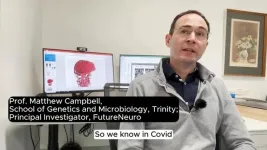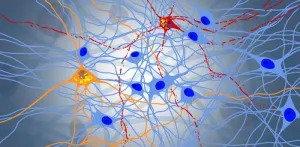(Press-News.org) A large-scale clinical trial of treatment strategies for Crohn’s disease has shown that offering early advanced therapy to all patients straight after diagnosis can drastically improve outcomes, including by reducing the number of people requiring urgent abdominal surgery for treatment of their disease by ten-fold.
The PROFILE trial, led by researchers at the University of Cambridge, involved 386 patients with newly-diagnosed active Crohn’s disease. Recruiting from 40 hospitals across the UK, and supported by the National Institute for Health and Care Research (NIHR) Clinical Research Network, it sought to test whether a biomarker – a genetic signature – could predict which patients were at greatest risk of relapses of their condition, and to test two different approaches to treating the disease.
Crohn’s disease is a life-long condition characterised by inflammation of the digestive tract. It affects around one in 350 people in the UK. Even at its mildest, it can cause symptoms that have a major impact on quality of life including: stomach pain, diarrhoea, weight loss and fatigue. Typically patients experience ‘flares’ of inflammation, where their condition worsens for a time, producing more symptoms and progressive bowel damage. As many as one in 10 patients will require urgent abdominal surgery to treat their condition within their first year of diagnosis.
The findings of the PROFILE trial, sponsored by Cambridge University Hospitals (CUH) NHS Foundation Trust and the University of Cambridge, are published today in The Lancet Gastroenterology and Hepatology. While the biomarker did not prove useful in selecting treatments for individual patients, a ‘top-down’ treatment strategy involving use of the drug infliximab straight after diagnosis, showed dramatic results.
Infliximab works by blocking a protein found in the body’s immune system, TNF (tumour necrosis factor)-alpha, which plays an important role in inflammation. The drug is administered through regular intravenous infusions directly into the bloodstream or injections under the skin. However, due to historical concerns about cost and side-effects – including an increased risk of infection related to immunosuppression – it is currently only offered when patients experience regular flare-ups that do not respond to less potent treatments.
In the PROFILE trial, patients were assigned at random to one of two treatment groups. Each group was given a different treatment strategy and patients were followed up over the course of a year.
The first group was treated using an ‘accelerated step-up’ approach, which is the conventional treatment strategy used in the UK and across most countries around the world. In this group, patients only started on infliximab if their disease was progressing and not responding to other simpler treatments.
The second group, however, was treated using ‘top-down’ therapy – that is, they were provided with infliximab as soon as possible after their diagnosis, regardless of the severity of their symptoms.
The results were dramatic: 80% of people receiving the top-down therapy had both symptoms and inflammatory markers controlled throughout the course of the entire year compared to only 15% of people receiving the accelerated step-up therapy.
Two-thirds (67%) of patients in the ‘top-down’ group had no ulcers seen on their endoscopy camera test at the end of the trial – something known as endoscopic remission. Endoscopic remission is considered very important as this has been consistently associated with decreased risk of later complications in Crohn’s disease. Most previous clinical trials of therapies have been considered highly successful based on getting 20 to 30% of patients into endoscopic remission.
As well as these findings, patients in the top-down arm also had higher quality of life scores, less use of steroid medication and lower number of hospitalisations.
Strikingly, while around one in 20 patients (5%) in the conventional treatment arm of the trial required urgent abdominal surgery for their Crohn's disease, only one in 193 (0.5%) receiving the ‘top-down’ therapy required such surgery.
Dr Nuru Noor from the Department of Medicine at the University of Cambridge, one of the study’s lead researchers and first author of the trial, said: “Historically, treatment with an advanced therapy like infliximab within two years of diagnosis has been considered ‘early’ and an ‘accelerated step-up’ approach therefore ‘good enough’. But our findings redefine what should be considered early treatment.
“As soon as a patient is diagnosed with Crohn’s disease, the clock is ticking – and has likely been ticking for some time – in terms of damage happening to the bowel, so there’s a need to start on an advanced therapy such as infliximab as soon as possible. We’ve shown that by treating earlier, we can achieve better outcomes for patients than have previously been reported.”
In fact, say the researchers, the improvements seen among the trial patients receiving ‘top-down’ therapy might be even more stark compared to usual clinical care. Few patients with Crohn’s disease in standard clinical care receive the rapid, ‘accelerated step-up’ approach provided by the trial protocol, and so the benefits of implementing a ‘top-down’ approach in standard clinical care might be even more pronounced.
Crucially, the team found no difference in risk of serious infection between treatment strategies, suggesting that infliximab straight after diagnosis was well tolerated, contrary to previous concerns about its safety. In addition, the cost of the drug, which is now an off-patent, generic and ‘biosimilar' medicine, has fallen considerably from around £15,000 to around £3,000 per patient per year.
Chief Investigator of the PROFILE trial Professor Miles Parkes, Director of the NIHR Cambridge Biomedical Research Centre, said: “Up until now, the view has been ‘Why would you use a more expensive treatment strategy and potentially over-treat people if there's a chance they might do fine anyway?’
“As we’ve shown, and as previous studies have demonstrated, there’s actually a pretty high risk that an individual with Crohn’s disease will experience disease flares and complications even in the first year after diagnosis.
“We now know we can prevent the majority of adverse outcomes, including need for urgent surgery, by providing a treatment strategy that is safe and becoming increasingly affordable. If you take a holistic view of safety, including the need for hospitalisations and urgent surgery, then the safest thing from a patient point of view is to offer ‘top-down’ therapy straight after diagnosis rather than having to wait and use ‘step-up’ treatment.”
The PROFILE team are now actively working on an analysis of the health economics to see whether the benefits of the therapy outweigh its cost.
Professor Parkes added: “It's not just those five per cent of people requiring surgery that we need to think about. In the ‘step-up’ arm lots of people experienced disease flares without necessarily needing surgery. And every time somebody flares, they require several consultations with specialist doctors and nurses, clinical investigations such as scans and colonoscopies, time off work, time out of education and so on – all leading to major impacts on quality of life for individuals.”
While there are other anti-TNF drugs, such as adalimumab, that work in a similar manner to infliximab and are significantly cheaper, more research is required to understand if it would be as clinically effective.
Ruth Wakeman, Director of Services, Advocacy & Evidence at Crohn’s & Colitis UK said: “Crohn’s Disease affects over 200,000 people in the UK and we know that many of them have symptoms for a long time before they are diagnosed. But diagnosis is not the end of their journey, and the trial and error involved in finding the right treatment can be challenging and distressing.
“This study shows what a dramatic difference early treatment with advanced therapy can make to newly-diagnosed patients. People with Crohn’s don’t want to be stuck in hospital or having surgery, they want to be out in the world, living their lives. Anything that speeds up the path to remission can only be a good thing.”
The research was funded by Wellcome and PredictImmune Ltd and supported by the NIHR Cambridge Biomedical Research Centre.
“If the drug had been offered in the first place, things could have been very different.”
Toby Moore, 28, was just ten years old when it became clear there was something wrong.
“I was at primary school at the time and was getting lots of abdominal pain, lots of going to the toilet and vomiting, low energy levels – I was effectively unable to consume any food or drink without some kind of problem. It was just terrible.”
He visited the GP repeatedly over six months, where among other things he was told it was due to the stress of Year Six exams. He says that for his mother and father, it was probably the most challenging time of their lives as parents.
“I was eventually referred to a paediatric gastroenterologist specialist who within 30 seconds of looking at me said, ‘Right. I think you have Crohn's disease. I'd like to do these tests,’ and off we went.”
The specialist was correct. He put Toby on an ‘elemental diet’ to manage his condition, which meant that for six weeks he could eat no food or drinks (other than water), only prescription shakes aimed at allowing his digestive system to heal. Toby then had to reintroduce different foods into his diet to see if they could identify what triggered his condition.
Not long afterwards, he had a ‘flare up’, with his symptoms worsening significantly. His local Peterborough hospital was unable to help and so he was referred to the Royal Free Hospital in London. There, his parents had to make the difficult decision of whether he should receive abdominal surgery or go onto biologic medication. They chose the latter, and Toby was put on infliximab.
“If you asked my parents now, they'd call it a light switch drug. I was infused with it on a Thursday and by the Sunday I was a different person. I was eating, drinking, my symptoms had stopped. It was unbelievable. Arguably, if that had been offered in the first place instead of the lighter approach, things could have been very different.”
Toby was on infliximab for several years, but was taken off the drug in late secondary school when he became unwell – “not in a Crohn's disease way, something else was going on”. He was taken into hospital, where the doctors immediately stopped the treatment, concerned it was a trigger.
Toby was transferred to Addenbrooke’s Hospital, where Dr Miles Parkes took over his treatment. It turned out that Toby also had large vessel vasculitis, another autoimmune condition. Whereas Crohn’s affects your digestive system, this affects blood vessels. It causes the aorta, the main blood vessel in your body, to become narrowed, which causes symptoms including weight loss, unexplained lower back pain and fatigue.
Since then, Toby has been on a number of different biologic treatments, each working for a while before their effects wear off, he experiences another flare up, and is prescribed a different drug. Were it not for the drugs, he says his life would be very different.
“It can be quite debilitating, especially when it's flaring up, as I'm sure you can imagine, when you have minimal control over certain bodily functions. It's not the most pleasant.”
His current medication, upadacitinib, involves taking a daily pill. It has helped him manage his condition – flare ups aside – allowing him to live a relatively normal life, hold down a steady job as a chef in a local hospice , close to where he lives, and start a family. But he still has to be very careful.
“Where possible I try to avoid stressful situations that life throws at you. When you live at your mum and dad's life's a bit more simple, you've got a few less responsibilities, so stress is slightly less, but when you go out into the big wide world – and I've got a two-and-a-half year old daughter now – that obviously adds a new dynamic to your life!”
Toby has nothing but praise for the NHS. “They’ve been just phenomenal. Miles is very good at nipping things in the bud straight away. He always actions things, he doesn't just say, ‘Well, we'll see how you are in a month’. So it never gets too out of control. My opinion of the NHS is really, really high. They've been a lifeline for me.”
Reference
Noor NM, Lee JC, Bond S, et al. PROFILE: a multi-centre, randomised, open-label, biomarker-stratified clinical trial of treatment strategies for patients with newly-diagnosed Crohn’s disease. Lancet Gastroenterol Hepatol; 22 Feb 2024; DOI: 10.1016/S2468-1253(24)00034-7
END
Treating newly-diagnosed Crohn’s patients with advanced therapy leads to dramatic improvements in outcomes
2024-02-22
ELSE PRESS RELEASES FROM THIS DATE:
Uncovering anxiety: Scientists identify causative pathway and potential cures
2024-02-22
Anxiety-related disorders can have a profound impact on the mental health and quality of life of affected individuals. Understanding the neural circuits and molecular mechanisms that trigger anxiety can aid in the development of effective targeted pharmacological treatments. Delta opioid receptors (DOP), which localize in the regions of the brain associated with emotional regulation, play a key role in the development of anxiety. Several studies have demonstrated the therapeutic effects of DOP agonists (synthetic compounds which selectively bind to DOPs and mimic the effect of ...
Stronger storms free more nutrients from mud flats
2024-02-22
If storms become stronger in the future due to climate change, more nitrogen may be released from the bottom of coastal seas. This is shown by research of marine biogeochemist Dunia Rios-Yunes at NIOZ in Yerseke. Rios-Yunes will defend her PhD-thesis today at the University of Utrecht. “The dynamics of nutrients in deltas and estuaries have been a bit of a blind spot for marine science, so far”, she says.
Inflatable couch
For her experiments, Rios-Yunes spent many hours on an inflatable couch on ...
New study is first step in predicting carbon emissions in agriculture
2024-02-22
MINNEAPOLIS / ST. PAUL (02/19/2024)—For the first time, researchers at the University of Minnesota Twin Cities (UMN) and the University of Illinois Urbana-Champaign (UIUC) have demonstrated that it is possible to provide accurate, high-resolution predictions of carbon cycles in agroecosystems, which could help mitigate the impacts of climate change.
The study by scholars from the UMN-led National Artificial Intelligence Institute for Climate-Land Interactions, Mitigation, Adaptation, Tradeoffs and Economy (AI-CLIMATE) and UIUC-led Agroecosystem Sustainability ...
Air pollution hides increases in rainfall
2024-02-22
We know that greenhouse gas emissions like carbon dioxide should increase rainfall. The emissions heat the atmosphere, causing a one-two punch: warmer oceans make it easier for water to evaporate, and warmer air can hold more water vapor, meaning more moisture is available to fall as rain. But for much of the 20th century, that increase in precipitation didn’t clearly show up in the data.
A new study led by researchers at the Department of Energy’s Lawrence Berkeley National Laboratory (Berkeley ...
Damage to cell membranes causes cell aging
2024-02-22
Our cells are surrounded by a fragile membrane that’s only 5 nanometers thick, 1/20 of a soap bubble. Cells are easily damaged by physiological activities, including muscle contraction and tissue injury. To cope with such damage, cells are equipped with mechanisms that can repair membrane damage to a certain degree.
Mechanical damage to the cell membrane was previously believed to trigger two simple cellular outcomes: recovery or death. In this study, however, the researchers uncovered a third outcome – cellular senescence.
“When I started this project, I simply aimed to understand ...
Mice surprise: Australian researchers discover new native species
2024-02-22
Australia can lay claim to two new species of native rodent thanks to a study from The Australian National University (ANU).
The aptly named delicate mouse was previously thought to be a single species spanning a massive stretch of the country from the Pilbara in Western Australia, across parts of the Northern Territory and through Queensland down to the New South Wales border.
But researchers at ANU and CSIRO thought there might be more to the story.
Lead author Dr Emily Roycroft, from ANU, said we now know there ...
Latest research redefines neurodevelopmental risks, outcomes for congenital heart disease
2024-02-22
Statement Highlights:
A new American Heart Association scientific statement updates more than a decade of research identifying, managing and preventing neurodevelopmental delays and disorders among people with congenital heart disease.
The new statement outlines important changes since the Association’s last statement in 2012, such as revised criteria to determine which children and adults are at high risk for neurological developmental delays and disorders, as well as an updated list of factors that may increase the risk.
Critical next ...
Researchers discover underlying cause of “brain fog” linked with Long COVID
2024-02-22
Today, a team of scientists from Trinity College Dublin and investigators from FutureNeuro announced a major discovery that has profound importance for our understanding of brain fog and cognitive decline seen in some patients with Long COVID.
In the months after the emergence of the novel coronavirus SARS-CoV2 in late 2019 a patient-reported syndrome termed Long-COVID began to come to the fore as an enduring manifestation of acute infection.
Long COVID has up to 200 reported symptoms to date, but in general patients report lingering symptoms such as fatigue, ...
Carbon emissions from the destruction of mangrove forests predicted to increase by 50,000% by the end of the century
2024-02-22
The annual rate of carbon emissions due to the degradation of carbon stocks in mangrove forests is predicted to rise by nearly 50,000% by the end of the century, according to a new study published in IOP Publishing’s journal Environmental Research Letters. Mangroves in regions such as southern India, southeastern China, Singapore and eastern Australia are particularly affected.
Mangrove forests store a large amount of carbon, particularly in their soils, however human development in these areas has led to the degradation of these carbon ...
Cracking the code of neurodegeneration: New model identifies potential therapeutic target
2024-02-22
Scientists at the University of Zurich have developed an innovative neural cell culture model, shedding light on the intricate mechanisms underlying neurodegeneration. Their research pinpointed a misbehaving protein as a promising therapeutic target in the treatment of amyotrophic lateral sclerosis (ALS) and frontotemporal dementia (FTD).
Neurodegenerative diseases cause some of the neurons in our brains to die, resulting in different symptoms depending on the brain region affected. In amyotrophic lateral sclerosis (ALS), neurons in the motor cortex and spinal ...







